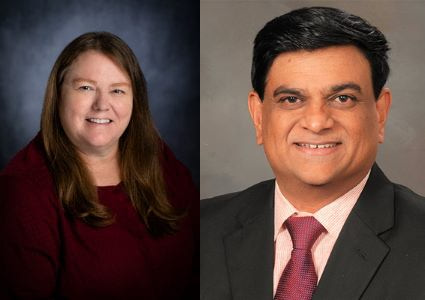The Geo-Institute Board of Governors has nominated Susan E. Burns, Ph.D., P.E., F.ASCE and Anand J. Puppala, Ph.D., PE, D.GE, F.ASCE, F.ICE to join the G-I Board for a term beginning in October 2022.

Burns is a professor in the School of Civil and Environmental Engineering and associate chair for administration and finance at the Georgia Institute of Technology in Atlanta, Ga. She earned a B.C.E. Civil Engineering (1990), M.S. Civil Engineering (1996), M.S. Environmental Engineering (1996), and Ph.D. in Civil Engineering (1997), all from Georgia Tech. Her research focuses on applications in geoenvironmental engineering with particular emphasis on the beneficial use of waste materials including dredged sediments, fly ash, and biomass fly ash; treatment of highway stormwater runoff using engineered materials; and erosion control of soils on highway rights-of-way.
She is a recipient of the National Science Foundation CAREER award, the Arthur Casagrande Professional Development Award (ASCE), and was named the 2020 Engineer of the Year by the Georgia Society of Professional Engineers (NSPE-GA). In 2021, Burns received the Class of 1940 W. Howard Ector Outstanding Teacher Award, which is Georgia Tech’s highest award for teaching. Most recently, she was selected as a fellow in the Georgia Tech Faculty Executive Leadership Academy.
Puppala is the A. P. Wiley and Florence Chair Professor of Zachry Civil and Environmental Engineering Department at Texas A&M University and is also the interim director of the Center for Infrastructure Renewal (CIR). In the past, he served as associate dean for research and was a distinguished scholar professor in the Civil Engineering Department at the University of Texas at Arlington. He has served on various leadership roles, including president of the United States Universities Council on Geotechnical Education and Research from 2007 to 2009, chair of the Soil Mechanics Section (AFS00) of Transportation Research Board (TRB) from 2014 to 2020, and vice chair role of the Geology and Geotechnical Engineering Section (AKG00) of TRB. He also served as Chair of Engineering Geology and Site Characterization (EGSC) and is a member of GI’s TCC for six years.
Puppala is a current member of the Transportation Infrastructure Group of the TRB. His research focuses on topics such as sustainable and resilient stabilization methods for problematic soils including expansive soils, pavement geotechnics with a focus on unsaturated soils, geosynthetics research studies for pavement and embankments, use of unmanned aerial vehicles for infrastructure health monitoring and surveying, and in-situ field testing and asset management studies. He currently serves as a director of the National Science Foundation’s Industry University Cooperative Research Center on Integration of Composites into Civil Infrastructure (CICI) at Texas A&M, with a focus on geosynthetics, chemical and polymer additive treatment studies for geomaterials. Puppala is a registered professional engineer in Louisiana and is a fellow of American Society of Civil Engineers (ASCE) and Institute of Civil Engineers (ICE), and a diplomate of the ASCE Academy of Geo-Professionals. He also received UT System’s highest teaching award, the Regents Teaching Award in 2010, and is an associate editor of various journals including ASCE Journal of Geotechnical and Geoenvironmental Engineering, and ASCE Journal of Materials, ASTM Geotech Testing Journal, Elsevier’s Transportation Geotechnics and Engineering Geology, and International Journal of Pavement Engineering.
At this time, any G-I member wishing to serve or nominate another member has 45 days to declare a petition candidate. To add candidates to the ballot via petition, signatures expressing support for a candidate must be obtained from a minimum of 150 GI members in good standing with the following distribution requirements: At least 15 signatures shall be obtained from each of at least five different ASCE Geographic Regions for a total of 75 signatures from five of the 10 ASCE Geographic Regions (i.e., 15 signatures/region x 5 regions = 75 signatures). The balance of the remaining signatures necessary to reach the minimum requirement of 150 may be obtained without consideration of ASCE Geographic Region distribution.
The Geo-Institute Member Identification number shall be provided for each signee. G-I staff shall check the validity of all petitions. Once verified, the candidate(s) shall be added to the ballot. No petitions will be accepted after the specified deadline has passed. For more information on the board’s nomination process and how to nominate a petition candidate, see the Geo-Institute Policies and Procedures document
 TEXTILES.ORG
TEXTILES.ORG


